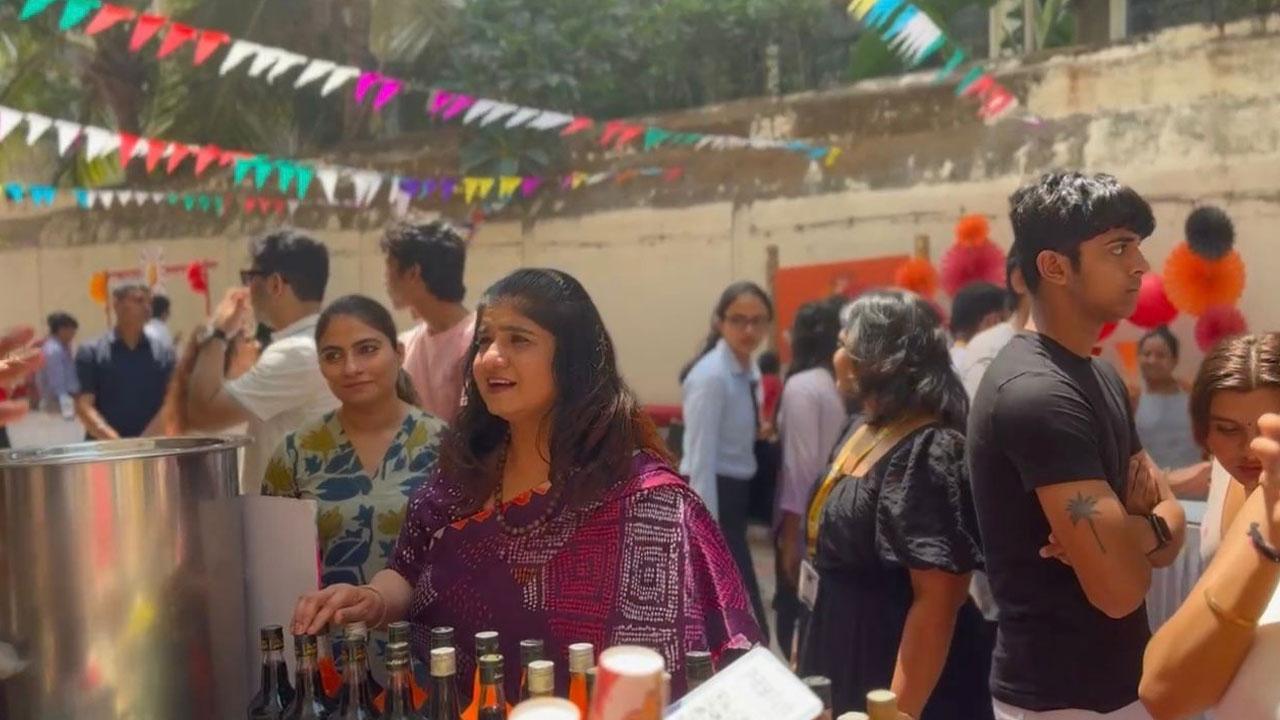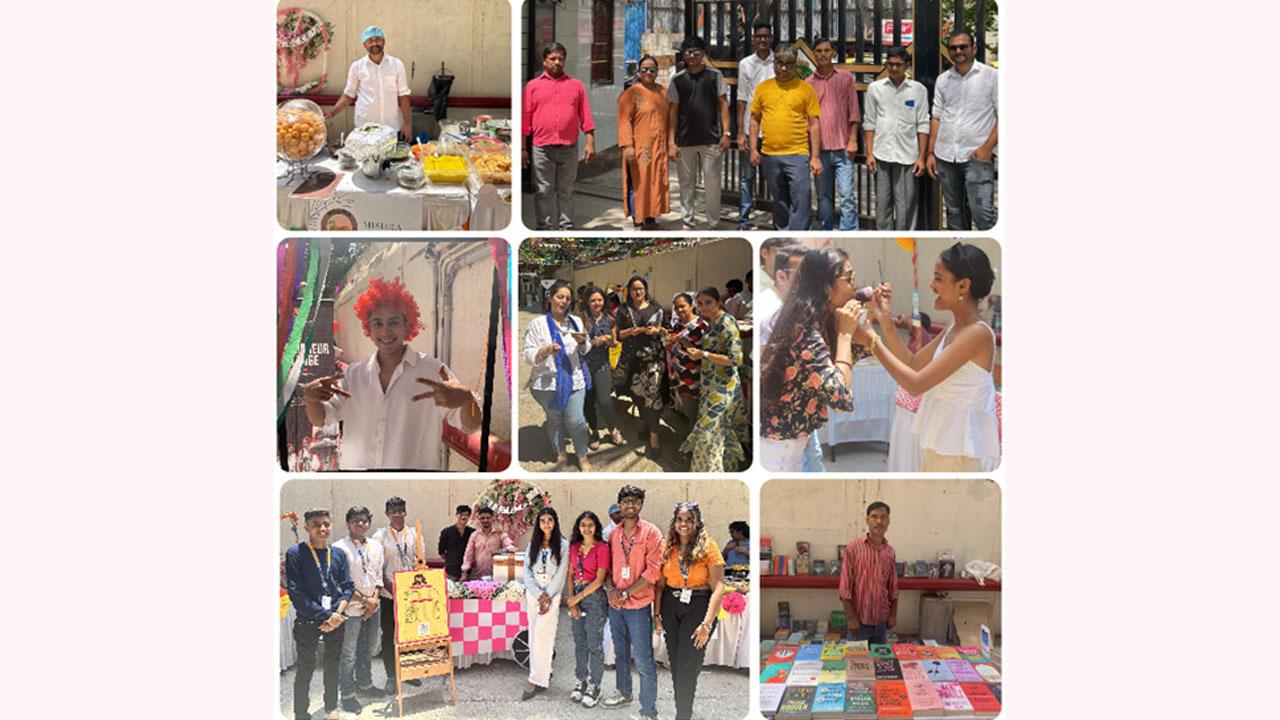Street vendors are the backbone of our economy, yet their contributions often remain in the shadows.

Vision in action - Vice Chancellor Dr. Hemlata K. Bagla powered up every StreetFlea stall with bold ideas & boundless energy, proving that big change can start with a hello, a handshake & small conversations.
In April 2024, a noteworthy initiative came to life at the Worli campus of HSNC University, Mumbai.
What began as a mini experiential learning drive for students soon morphed the campus quadrangle into a pulsating hub of grassroots innovation - a space where streetpreneurs, everyday ingenuity and local enterprise took center stage. Streetpreneurship 2024 was more than just an event; it was a tribute to resilience, untamed creativity and the power of community-driven enterprise. Now, a year later, we are not just reminiscing - we’re retracing the footsteps of a movement that’s still gaining momentum.
One year later, Col. Dr. Hemlata K. Bagla, Vice Chancellor of HSNC University and Director of the Niranjan Hiranandani School of Management & Real Estate (NHSMRE), shared an exclusive behind-the-scenes reflection on the trail-blazing initiative - a vision brought to life through months of ideation, meticulous planning and careful fine-tuning.
“Street vendors are the backbone of our economy, yet their contributions often remain in the shadows. By welcoming them onto our campus, we aimed to equip them with practical knowledge and tools to grow their businesses and enhance their livelihoods. These informal interactions sparked meaningful collaboration - our students designed real-world initiatives to bridge the gap between academic learning and street-level enterprise. It became a two-way ‘Wisdom Exchange,’ where students shared emerging trends and digital tools, while vendors offered invaluable lessons in street-smart entrepreneurship,” Dr. Bagla reflected with a smile.
“With start-ups gaining national momentum and the National Education Policy (NEP) emphasising the creation of innovation and incubation centers in higher education, our students took the vision a step further. They not only conceptualised but also launched and successfully executed the 25-day Streetpreneurship Challenge,” affirmed Dr. Bagla.
“Our aim was to craft an immersive learning experience for students, while uplifting local street vendors in the process. The overwhelming success of the Streetpreneurship Challenge surpassed our expectations and highlighted the true strength of community-driven collaboration,” Dr. Bagla stated.
Dr. Bagla likened the initiative to the visit by Harvard Business School students over a decade ago. They came to Mumbai to study the supply-chain and logistics of the Dabbawalas-lunchbox delivery men renowned for their efficiency. Despite having no formal business education, the Dabbawalas operate with such precision that they hold a Six Sigma rating of 99.99%-meaning fewer than one in six million deliveries goes wrong.
The event centered around empowering Mumbai's street vendors and fostering collaboration between them and the students. Through this unique initiative, students actively engaged with street vendors, not just as helpers but also as eager learners. The event served as a symbiotic learning experience, where students gained insights into the challenges faced by street vendors while vendors in turn, shared their entrepreneurial skills. With a focus on practical, real-world solutions, ‘Streetpreneurship Challenge’ attempted to catalyse growth for the street vendors, turning the bustling streets of Mumbai into a vibrant marketplace of ideas and opportunities.
Since then, many of the featured ‘streetpreneurs’ have taken their ideas far beyond the pavement. Their stories are powerful reminders of the impact that unfolds when grassroots talent is given the platform and the push- it truly deserves.
The Streetpreneur Challenge was a three-phase, 25-day initiative designed to fast-track the growth of local street vendors through strategic collaboration with students from HSNC University.
20 student teams, each comprising six members, ‘adopted’ 20 different street vendors for 25 days - diving deep into their day-to-day operations to understand the real-world challenges and ingenious strategies behind street-level entrepreneurship. The focus was on quick, high-impact interventions aimed at boosting visibility, improving operational efficiency, solving pressing problems and building community support.
Phase 1 involved immersive engagement - students shadowed and observed their assigned vendors to understand their business models, pain-points and street-smart tactics. The goal was to co-create solutions that could enhance sales and profitability through fresh insights, student-led innovations and community-focused marketing strategies.
Phase 2 brought these efforts to the forefront with a vibrant, one-day StreetFlea event on campus, where the vendors showcased their offerings in a curated, high-energy marketplace environment.
The journey culminated in Phase 3, where each team presented their findings, innovations and scalable ideas to a panel of mentors and domain experts - all vying for the top spot while celebrating a transformative learning experience.
In the heart of Mumbai’s urban chaos, a vibrant and often-overlooked economy thrives-street entrepreneurship. Rooted in resilience and ingenuity, it embodies the essence of a free market: open access, competition and grassroots participation.

Where Hustle Meets Hope: The Story of Rajesh Gupta
Rajesh Gupta, a street vendor near Mumbai’s Crawford Market, exemplifies grassroots entrepreneurship. Selling affordable, multi-purpose home products bang opposite a luxury store, he represents the city’s stark contrasts. With no formal education, Guptaji relies on instinct, charm and persistence to run his modest yet thriving stall.
His business model may not boast formal funding or glossy marketing campaigns, but it thrives on trust, consistency and a deep understanding of supply chains and consumer behaviour.
One quiet evening, a student team approached Guptaji with a simple request-to shadow him for a day. Impressed by their enthusiasm, he agreed without a second thought. Over the course of the day, he shared his insights on pricing strategies, customer psychology and negotiation techniques. Though he never attended college, Guptaji has mastered these skills through trial and error, driven by instinct and refined through relentless hustle.
His candid remark about preferring bribes over bureaucratic registration highlights the systemic challenges small traders face. His influence has sparked a wave of local enterprise, turning the street into a vibrant marketplace. Inspired by vendors like him, HSNC University students launched a hands-on initiative to bridge academic theory with real-world streetpreneurship.
Business education is often confined to textbooks and air-conditioned classrooms, but this initiative set out to shatter that mold-encouraging students to step into the real world, engage with it, collaborate and learn from Mumbai’s thriving community of street entrepreneurs.
As students observed and worked alongside vendors in bustling markets like Colaba Causeway, Chor Bazaar, Andheri, Bandra and Dadar, they gained hands-on experience with complex aspects of entrepreneurship such as pricing, supply chains, customer engagement, persuasion, market demand and adaptability-valuable lessons that aren’t often covered in traditional classrooms but are deeply felt in real life.
One student, inspired by the resilience of the vendors, remarked, “Why does society fail to recognise their determination? These aren’t just vendors-they’re creators, risk-takers, innovators and masters of jugaad.” Moved by this realisation, that student, along with others, took it upon themselves to document these stories-amplifying the voices of street entrepreneurs through interviews, photography and social media. In doing so, they helped bridge the cultural and psychological gap that academia has long overlooked.
“I never truly understood the effort behind street vending until I met these incredible vendors. Their stories are nothing short of inspiring and I've gained so much insight from them,” said Diya Ahuja, an aspiring entrepreneur from HSNC University.

Dharti Patel, who relocated from Bangalore to pursue her MBA at HSNC University, shared a poignant moment with a street vendor who told her, “I don’t need a big shop to feel successful-just enough to feed my family and sleep peacefully.” Reflecting on the encounter, she said, “It taught us a lesson no textbook could-sometimes, having enough is truly everything.”
In April 2024, at the end of the 25-day challenge, the campus came alive with StreetFlea-a lively, open-air market where street vendors showcased their ventures to a live audience. It was more than just a display; it was a platform for untapped brilliance-the kind that fuels communities from the ground up.
For instance, one standout stall at the StreetFlea offered a unique chaat experience-offering 8 panipuris (water balls) per plate with 8 different flavours of water, for just Rs 40. Customers could choose from a variety of fillings like aloo, sprouts, cheese-corn and spicy chana-boondi, creating a fun and value-packed taste adventure. The stall also cleverly upsold by offering extra sweet and tangy pani-shots for Rs 20 and mini servings of dahi-puri, bhel or masala soda for an additional Rs 40.
The student team working with the chaat vendor implemented a loss-leader pricing strategy, drawing customers in with enticing deals while using vibrant branding, strategic upselling, street-level buzz and social media to create a loyal fanbase. They also experimented with unique fusion offerings to further captivate food lovers.
To enhance the perception of hygiene, students introduced disposable gloves, tissue packs and eye-catching signage featuring a "Hygiene First" slogan. Their efforts not only increased customer trust and repeat visits-especially from health-conscious youth-but also sparked the innovative idea of a sleek, multi-layered, spill-proof, eco-friendly panipuri takeaway box, designed for high-rise urban living. With bulk discounts, chilled pani compartments and easy assembly, it delivered the delight of street food directly to skyscraper doorsteps.
Another great example is Tai Chinese, a Pan-Asian food stall run by a dynamic mother-daughter duo, which underwent a student-led revamp. Known for their perfected recipes and secret blend of spices that ensure customer-loyalty, the stall underwent a transformation with a fresh name, a redesigned menu and a strong visual identity that increased food enthusiast patrons. To add some excitement, the team introduced a spicy challenge and in an effort to connect with college students, they launched affordable combo meals and a QR-based ordering system, making the experience faster, smarter and more convenient. Spice customisation became a highlight, offering options from mild to Tai-level spicy! They even rolled out DIY combos, allowing customers to build their own wok by choosing their base, sauce and protein/veg-a fun, personalised touch. For first-timers, they introduced the ‘Tai Trials’ tasting tray, featuring mini portions of three dishes with sealed disposable cutlery. To elevate the perception of hygiene and quality, the staff wore branded aprons, gloves and hair caps. Customer feedback was also prioritised, with QR codes on packaging linking to Google Forms or a playful emoji-based survey.
At the StreetFlea event, Dr. Bagla’s active involvement and thought-provoking questions brought tremendous value, highlighting her commitment to building meaningful connections and sparking impactful change. Her presence emphasised the crucial role of collaboration and community engagement in tackling societal challenges.
“StreetFlea demonstrated the powerful synergy between hands-on entrepreneurship and academic knowledge. This initiative offered our students a rare experiential learning opportunity, while also highlighting the resilience and business savvy of local street vendors. The impressive sales made in just two hours highlight the significant impact such collaborations can have in supporting micro-enterprises and driving economic growth,” Dr. Bagla shared.

“In order to make the StreetFlea more interesting and increase the footfall, we had lemon race, flashmob dance and arcade games (such as Pyramid Toss, Ring a Bottle, Balloon Pop, Hook a Duck, Tin Can Alley, Play Your Cards Right, Darts and Hoopla) ,” Krish Budhwani said.
With a grin, fellow student Pallavi Gupta recalled, “Behind the scenes of StreetFlea, it was a whirlwind of organised chaos, creative frenzy and caffeine-powered collaboration. From last-minute banner fixes to late-night brainstorming sessions, we were balancing ideas and coffee cups like seasoned pros. There were definitely tensed moments and frayed nerves, but that was all part of the adventure. The real magic unfolded during those intense 25 days-that’s where friendships were built, skills honed and unforgettable memories were made!”
Students Empowering Street Entrepreneurs
Create a Memorable Brand:
Student teams developed eye-catching signage, creative branding and catchy slogans to reflect the unique personality of each stall, helping them stand out in the crowd.
Digital Uplift:
Students guided vendors in launching Instagram, YouTube and Meta profiles, utilising popular local hashtags to expand their digital presence and engage a wider audience. They also introduced contactless QR code payments for smoother transactions.
Customer Engagement:
Student teams organised fun contests and challenges, encouraging customers to share their experiences on social media. They also collaborated with bloggers and influencers to promote the stalls and offered free samples or discount coupons for those visiting after seeing a review or post.
Breaking Barriers:
By sharing success stories, the student teams bridged the gap between the sophisticated world of the elite and the hardworking spirit of street vendors-something that’s rarely touched upon in traditional classrooms.
Feedback Loop & Improvements:
Students actively sought feedback from customers to enhance offerings, using feedback forms, social media polls or casual conversations at the stalls to gather valuable insights and improve the customer experience.
Why this matters:
This initiative goes beyond simply studying alternative economies-it serves as a social intervention, aiming to bridge the gap between formal and informal sectors, the privileged and the marginalised, theory-driven learning and hands-on experience. Street vending provides individuals, particularly from lower socio-economic backgrounds, with an opportunity to enter the market without requiring capital, expensive retail spaces or bureaucratic hurdles.
Despite facing numerous challenges-such as government crackdowns, illegal fee collection, limited access to credit, long hours and the threat of eviction-street vendors continue to thrive. They cater to both budget-conscious customers and those seeking authenticity, value or novelty. These vendors break down social barriers by creating shared spaces for exchange in a city often marked by division. Operating without formal business structures or venture capital, they demonstrate a quiet mastery that rivals any formal business education.
In a world that values innovation and adaptability, may be we can look beyond traditional business models. The future of entrepreneurship might lie not in start-ups and unicorns, but in the ingenuity of individuals who build businesses with little more than a dream, a small stall and sheer determination.
According to government estimates, street vending makes up 14% of urban informal employment in India, with around 10 million street vendors across the country. Street entrepreneurship is inherently inclusive, providing opportunities for a diverse range of individuals. With an increased focus on vendor registration, digital transactions and access to formal banking, along with a shift in citizen behaviour towards digital payments, the future of street vending is undergoing a significant transformation. Moving forward, this emerging business model requires innovation, the dismantling of myths and the fulfillment of its potential. After all, with 10 million street vendors in India, this is no small-scale business-it's a vast and untapped opportunity.
 Subscribe today by clicking the link and stay updated with the latest news!" Click here!
Subscribe today by clicking the link and stay updated with the latest news!" Click here!






